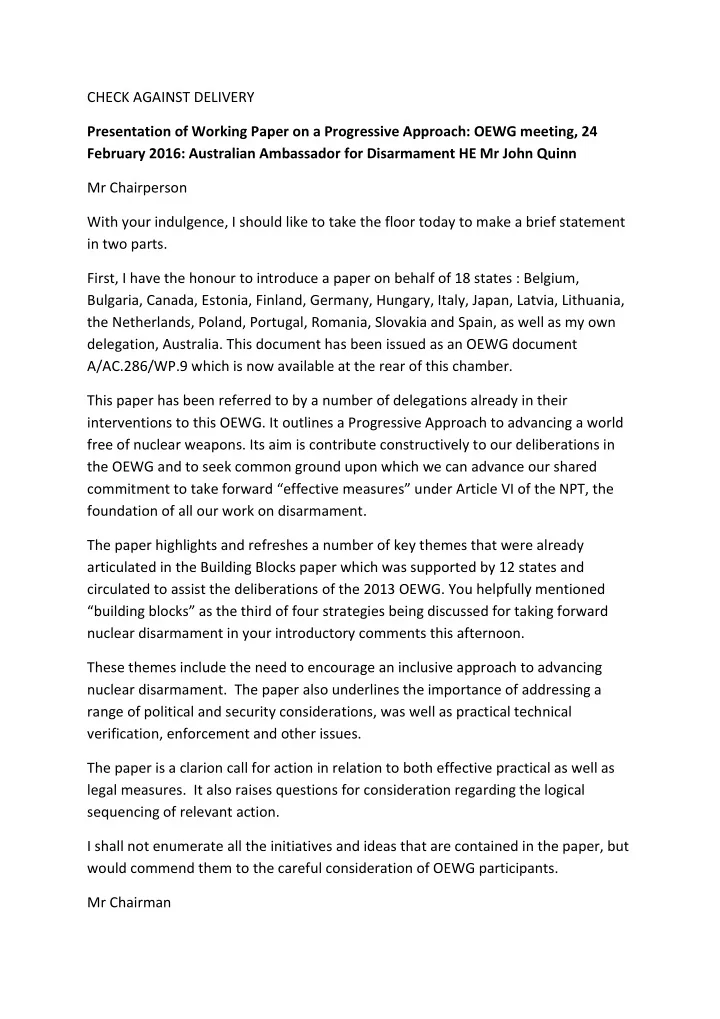

CHECK AGAINST DELIVERY Presentation of Working Paper on a Progressive Approach: OEWG meeting, 24 February 2016: Australian Ambassador for Disarmament HE Mr John Quinn Mr Chairperson With your indulgence, I should like to take the floor today to make a brief statement in two parts. First, I have the honour to introduce a paper on behalf of 18 states : Belgium, Bulgaria, Canada, Estonia, Finland, Germany, Hungary, Italy, Japan, Latvia, Lithuania, the Netherlands, Poland, Portugal, Romania, Slovakia and Spain, as well as my own delegation, Australia. This document has been issued as an OEWG document A/AC.286/WP.9 which is now available at the rear of this chamber. This paper has been referred to by a number of delegations already in their interventions to this OEWG. It outlines a Progressive Approach to advancing a world free of nuclear weapons. Its aim is contribute constructively to our deliberations in the OEWG and to seek common ground upon which we can advance our shared commitment to take forward “effective measures” under Article VI of the NPT, the foundation of all our work on disarmament. The paper highlights and refreshes a number of key themes that were already articulated in the Building Blocks paper which was supported by 12 states and circulated to assist the deliberations of the 2013 OEWG. You helpfully mentioned “building blocks” as the third of four strategies being discussed for taking forward nuclear disarmament in your introductory comments this afternoon. These themes include the need to encourage an inclusive approach to advancing nuclear disarmament. The paper also underlines the importance of addressing a range of political and security considerations, was well as practical technical verification, enforcement and other issues. The paper is a clarion call for action in relation to both effective practical as well as legal measures. It also raises questions for consideration regarding the logical sequencing of relevant action. I shall not enumerate all the initiatives and ideas that are contained in the paper, but would commend them to the careful consideration of OEWG participants. Mr Chairman
I would like to now make a few general observations on behalf of my own delegation: • One key challenge for us now is how to deal with the significant and fundamental differences that evidently exist in relation to progressing nuclear disarmament. • In this regard, I commend the approach adopted by the recently concluded UNGGE on an FMCT. • Recognising from the outset that the fundamental differences between participants with regard to this topic, the GGE focussed on identifying areas of common ground which were encapsulated in agreed recommendations. These provide what the GGE chair Ambassador Golberg of Canada described as “signposts” to take forward this important work. • As a corollary, it was recognised that the narrative of the GGE report needed to reflect fully and accurately the significant differences between participants. • In other words, the recommendations and the narrative of the GGE report have to be read together to get the full picture. • This approach could offer a way forward for managing the differences that are inevitably being articulated in the course of our OEWG discussion. • I offer this as one suggestion, noting that there may be other useful precedents which might also help guide our work under your able chairmanship. • On this point, I particularly commend your commitment to use your best endeavours to strive for a consensus outcome on the report, including its recommendations, while recognising of course the mandate of the OEWG and the parameters of UNGA Rules of Procedure. Mr Chairman • A particular challenge I would like to raise is how the OEWG can engage with the nuclear weapon states and nuclear weapon possessing states as we work to progress nuclear disarmament. They have exercised their sovereign right not to participate in the OEWG. • We welcome that, as part of your extensive outreach before the OEWG got underway, you took the initiative to consult such states. We need to reflect further on how to take this engagement further. Without input from these countries, the practical value of our deliberations will remain in question. • Another key challenge is how we refresh and update the disarmament debate on disarmament. While the humanitarian consequences discourse lent
renewed attention to nuclear disarmament, we have also witnessed technological and other changes over recent years which have not been fully been taken into account in this debate. • We also need to take account of the current difficult geo-political environment. We can’t dismiss the genuine nature of the national security concerns of a range of member states. o For this reason, a creative focus on CBMs will be important. o We should ask ourselves what can we do short term in this regard. o Again I would recall the value of FMCT discussions as a CBM in themselves. This process engages NWS and nuclear possessing states as well as NWS on a series of issues which must be addressed to make progress on disarmament. Accordingly, intensive further work on an FMCT must be sustained, building on the momentum of the GGE report. • In this context, let me conclude that a key role for the OEWG will be rebuild trust and put the disarmament process back on the rails. o We are confident that the OEWG under your stewardship can lead us to this outcome. o We also welcome constructive signals from other delegations of a desire to bridge differences, such as those from preceding speakers - our distinguished Austrian and Finnish colleagues. o We shall also study with interest the working paper just introduced by Austria.
Recommend
More recommend